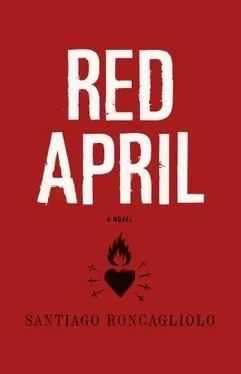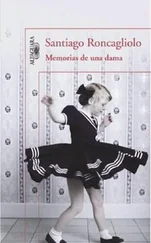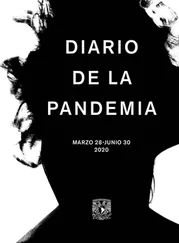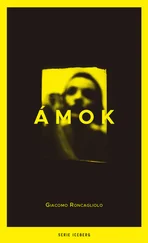The commander lowered his voice. He had a new gaze, one the prosecutor had never seen. He said:
“It's clear, isn't it? Now do you understand? Do you need more explanations?”
The prosecutor wondered if he could be the one who read in twisted lines. If his reports were the ones that lacked meaning. If perhaps Carrión's papers were the truly legible ones but he no longer was capable of understanding them. Then he thought of Edith and realized that in reality it no longer mattered.
“There is no explanation for what you have done,” he said.
As Carrión walked slowly to his desk, the prosecutor moved his hand toward his weapon. The commander said:
“I didn't want it, little Chacaltita. I didn't want it to be this way. They forced me.”
“Who?”
Now the commander twisted beside the desk, fell to the floor, and his eyes filled with tears. He was trembling.
“Don't you see them, Chacaltita? Is it possible you don't see them? They're everywhere. They're always here.”
Then Chacaltana saw them. In fact, he had been seeing them for a year. All the time. And now the blindfold fell from his eyes. Their mutilated bodies crowded together around him, their chests, split open from top to bottom, reeked of the grave and death. There were thousands and thousands of corpses, not only there in the commander's office but throughout the city. He understood then that they were the dead who sold him newspapers, drove the buses, made handicrafts, served him food. There were no other inhabitants in Ayacucho; even those who came from elsewhere died. But there were so many dead that by now no one could acknowledge it. He knew a year too late that he had come to hell and would never leave. The commander continued speaking in a cavernous, guttural voice:
“They asked me not to spill blood in vain, Chacaltana, and I didn't: a terrorist, a soldier, a peasant, a woman, a priest. Now they're all together. They form part of the body demanded by all those who died before. Do you understand? They'll help to construct the history, recover the greatness, so that even the mountains tremble when they see our work. At the beginning of the eighties we promised to resist the bloodbath. Those who have been sacrificed recently have not died. They live and feel in us. Only one more is needed to make the earth shudder, the prairie burn, the world turn upside down. Only the head is missing …”
He disappeared behind his desk. The prosecutor took out the pistol. He aimed in his direction. At that moment no image made his hand shake. It was as if all his bad dreams had come to an end.
“Get away from the desk, damn it!”
The commander peered out and suddenly smiled, as if he thought everything was amusing and original.
“I see you're using my weapon. Are you getting used to it?”
“Raise your hands and move back. If I don't blow your head off right now it's only because you didn't act alone. I want you to tell me who your accomplice is — or who they are. And I want you to tell me before I lose my patience, because after that you won't be able to say anything.”
The commander remained motionless beside the window. His hands were raised, more in an ironic gesture than in surrender. The smile had not left his face.
“To tell the truth,” he replied, “my best accomplice was you.”
At that moment, the lights in the office went out. The prosecutor tried to look through the half-open door. He did not even know where the door was. The blackout affected the entire building. The blinds were closed.
“Who's out there? Who turned out the light?”
In the dark he heard the voice of the commander.
“You must feel a little guilty, Chacaltana. All the people you talk to die. That's very bad.”
He heard a drawer open and close. He fired toward the place the sound came from. For a moment, the darkness of the empty building returned only the echo of the bullet. Then he heard Carrión's voice again:
“After all, it isn't the first time you've killed, is it? Perhaps that's why I've enjoyed all of this so much. It's a game between equals.”
He moved the weapon toward the voice, but the commander moved constantly. He wanted to follow him. He wanted to speak to him in order to track his voice, though that would also reveal his own position:
“What the hell are you talking about?”
When he bumped into a lintel he realized he was going through a door. The voice seemed to be very close, but it rebounded all around him in the open space of the building.
“Why don't you ever talk about your father, Señor Prosecutor?”
He leaned against a wall. He was afraid. Suddenly, the memory of his dreams was projected on the darkness. He heard the commander again:
“I knew your father.”
“I never had a father.”
The prosecutor felt a tremor coming from his stomach.
“We all had one, Señor Prosecutor. Often they turn out to be motherfuckers, but that's no obstacle to paternity. Yours was almost better than mine.”
The prosecutor fired. He heard a board creak. He supposed they were out of the office, near the stairs. The commander continued:
“Yours was a soldier too. A handsome young man, a white man. He married a very sweet girl from Cuzco. I know she's always present for you.”
“That's enough, Carrión. Shut up!”
“Why? Do stories of the dead frighten you? Because he's dead. The living ought to frighten you more. And you also must have known that he was dead. You must have known that very well.”
The prosecutor stumbled on a step and fell. Four steps down he managed to grab the banister. He got up aiming in front of him, not knowing what was before him or behind. Now he was trembling. The blows from the staircase did not hurt as much as those from his memory.
“Now do you remember?”
“Be quiet, Carrión! That's enough!”
“He was something of an animal, that young man. A good kid, except when he drank. Then he became difficult. You weren't so little that you've forgotten …”
The prosecutor fired again. Now he heard a piece of plaster fall off the wall.
“Your mother suffered a good deal when he got like that … Especially because he was a … let's say … a violent drunk. You didn't like it either. But in those days one didn't object to a husband, and you weren't old enough to return the blows. Isn't that right? There were too many blows. Whole rainstorms of bruises. He broke your mother's arm twice. You almost lost an eye. Remember?”
Now the images came one after the other in the prosecutor's mind. As if he were rebelling after decades of being forgotten, his father appeared before him. His twisted smile, his alcohol breath, the blows, the blows, his belt, his fist, the blows.
“He doesn't exist … He no longer exists …”
“You were a smart kid. And there were kerosene lamps in your house. Or maybe oil. One of those flammable things that always has a flame burning. Let's be frank, the supply of electricity in Ayacucho was always pretty unreliable.”
“That isn't so … It's not true!”
The prosecutor did not know if the commander's voice came from one floor or another. Now it came from everywhere, from inside himself, from the dark.
“Did you enjoy it as I've enjoyed it, Chacaltana? Did you like it? He was too busy kicking her to see what the boy was doing, the boy he thought was retarded. Were those his words?”
“Leave me in peace!”
But the whirlwind of memories was not going to leave him in peace. It would never leave him in peace.
“Do you realize what you did, Chacaltana? And how you ran away? You didn't even go back to hear your mother's screams, you didn't take a risk even for her. You only ran, you ran wherever your legs took you, and you got to Lima, far away, very far away, where the cries of Señora Saldívar de Chacaltana wouldn't reach you. But the dead don't die, little Chacaltita. They keep screaming forever, demanding a change. And now when we're about to change everything, you don't like it. Now when only one more life has to be given, you find it repugnant. You'll give a life, Chacaltana. And after you give it, you can be at peace. It will all have ended. You won't have to worry anymore.”
Читать дальше












